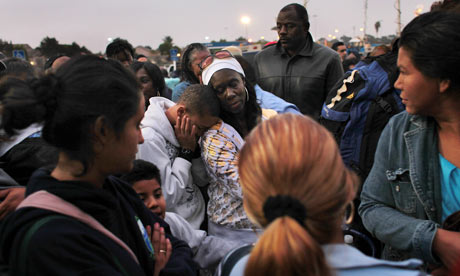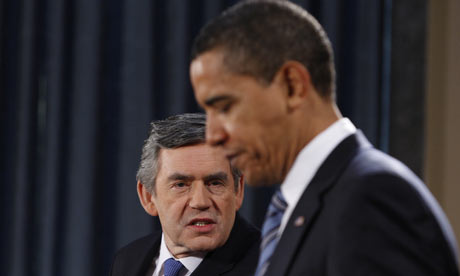First, Labour did not ruin the economy. In some respects they made it more broadly-based. Look at the quality of life across the UK that people now enjoy compared with the mid-nineties and it is astonishing. Even working class dole getters have mobile phones and can eat.
They raised the bar of the poverty trap but it is still there and more mercilessly entrenched. Tax credits make it extremely difficult to earn more than a particular level, but they did raise the bar.
People on the whole got richer. But they also turned the heat up on a system that rewards the very rich. More people got richer than they should have. The reason that Labour saw Britain's woes as a lack of management. Managers were implemented at all levels and corporations levered in to supplant public administrators. This was under the guise of efficiency but in truth wafted up vast tracts of power to people not acting in the best interests of the people. Banks, as we have seen were a great sign of this shovel up and do over culture.
The wealth - technically income - was not spread wide enough. Come a wobble the wealth upped and left and so the economy wobbled.
Economies are strange things. They are run by people but those that run them believe they are run by levers. By run, I mean the actual running, acting in and dishing out. When you ignore the people who are running the economy, which Britain - and almost every industrialised country - continues to do, you run down the lifeblood of the country. I'll come to some proposals on restoring this lifeblood in a minute.
To repeat, Labour did not ruin the economy but they did run it dry. Politics of the manager that saw systems instead of communities that could flourish. Social disturbance was an outgrowth of this. People ignored become violent, rejects of the system that ignores their vital being. You can't combat that with police officers or surveillance but with an assault on people's sense of worth. The kind of assault that leaves them gasping and joyful with each breath of life. The Labour government did not deliver this, and neither will a Tory one.
In strict economic terms, Labour did OK. What happened was that spending was over-extended for longer than it should have been and there is some intelligence in the argument that says they should have concentrated more on system reform - or allowed innovations within the system to occur - than their politics could allow. In this sense Blair may have been on the right track, were in not for the ridiculous terms of PFI agreements and their implementation. This is a change of hear from some of the old posts on this blog.
The Tories may run the economy in a responsible fashion but they will completely ignore the reason behind the collpase, which is social in nature and in deep need of healing. There is not a rupture, but an overload of sclerosis. And the sclerosis comes from a deep loss of freedom.
If you build a system in which to run people, to contain them or administrate them, the people will show you its limits fairly soon. If you give them no running of their own country, if you keep this between your self and an elite, people will start to revolt. But they won't see it as a revolt because the system you have created is so intricate as to sway their attention.
The story of British society today is boredom and social breakdown. The breakdown is shown on horrendous estates, petty crimes and people disenfranchised from their neighbours. The rise of the BNP is typical of this. The boredom is shown in hysterical hedonism, binge drinking, obsession with entertainment and little room for real expression that is not economically governed. Those that try get closed down or ignored until irrelevant.
Why are the people bored? We told them their life was worth nothing but a job and an injured community.
Why do people seem so happy? We told they were managers and they believed.
The system is running down - through no fault of its own, it was elegantly designed', but through its components, the people rusting up. Some people have noticed and are living from a deeper freedom than any system can contain. They move in and throughout and away from the normal boundaries. You see them through the lights of their eyes, their endless energy for innovation and ability to walk inexplicably when there appeared a chance for greatness.
They are not Ken Wilber, Paulo Coelho or Yann Martel or any Booker prize winner. If they are a yoga teacher, they have kept quiet.
The life-blood of the economy will be restored through participation. The lifeblood of the economy will be restored through people having a say in the real factors they hold as valuable. Communities should not be told what happens on their land. Anyone working on that for a civil purpose, such as a company working on it for greater returns of efficiency - should be beholden to the needs of the community as well as those that they serve.
Education should be run in partnership with community boards. Healthcare broaden its vision of well-being. Companies should be managed with more votes. Old people's homes should resemble less cattle farms and more places with dignity.
On the subject of older people. More respect should be given to the wisdom of the elderly and especially Elders people worthy of the name. For this reason the House of Lords should stay as it is, a guarantor of enlightened democracy.
Community participation through networks and overlays of communities. Of course some people need to administrate at a higher level - governments and collections of nations will continue to exist but they will be beholden to the people at all levels. This is not the case now and I doubt has been in any real world democracy. So far it's been a myth.
The most stunning fact of economics, which is too large to include in any theory, is that the strength of economies is defined by their social quality. The care and attention needs to be for people and their communities, not revving up the engines that drive them into the ground. This has been the practice in Britain for too long - social strength only being tangentially improved by economic focus.
That focus now needs to shift. It has been the contention of this blog that in people's minds and hearts it has shifted, but the system is now adjusting to this deep shift in people's psyche. Economic consequences are now no more an issue. The fate of people is.

